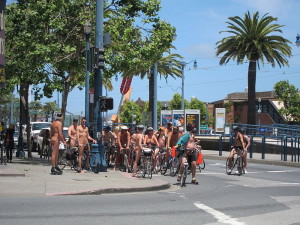Recall that as we discussed earlier this year, San Francisco (SF) Ordinance 120984 banning public nudity was the subject of a constitutional challenge filed in federal court before it was even officially adopted.
That challenge was not successful. In January, the federal district judge issued an order and opinion rejecting the equal protection and First Amendment claims that the statute was facially unconstitutional, although he left open the possibility of an as-applied challenge. An as-applied challenge may be more likely than not, as the ordinance contains a permitted parade, fair, or festival exemption that may be a springboard for a challenge. (The ordinance also has an exemption for persons under 5 years old).
The judge’s relatively brief 19 page opinion trod familiar legal ground, finding nudists were not a protected class, that nudity per se is not “inherently expressive,” and that the nudists did not make an argument that the ordinance was not rational.
As Joe Eskenazi writes for SF Weekly, despite the claim of SF’s “urban nudists” to special status because SF had not previously banned nudity, this claim has more political than constitutional traction. The situation on New York’s Fire Island we previously discussed is an apt comparison. Another recent nudity debate is occurring in Dallas. And Chapter 2 of Dressing Constitutionally considers various prosecutions for “indecent exposure” and the gendered nature of that designation, as well as the possibility of nudists as a protected class.
Eskenazi also writes that it seems that the plaintiffs can no longer afford to litigate. (Indeed, the docket shows the attorney has withdrawn).
Yet while there may not be federal constitutional relief, there may be state constitutional or statutory claims. Failing that, there is always the SF Board of Supervisors: they can easily repeal or amend the ordinance.

